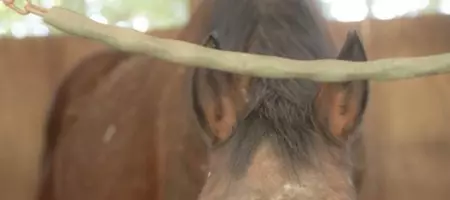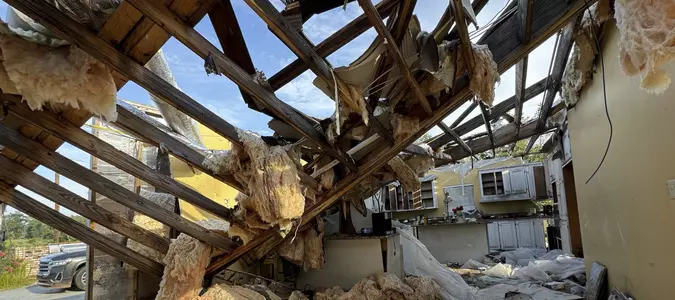

California lawmakers pass bill that will bar some popular puppy sellers
SACRAMENTO, Calif. — State lawmakers approved a bill Monday that would ban online pet dealer websites and shadowy middlemen who pose as local breeders from selling dogs to California consumers — the latest move to curtail the pipeline from out-of-state puppy mills. Assembly member Marc Berman, D-Menlo Park, said Assembly Bill 519 will help ensure buyers aren’t misled about where their puppies ...

Tom Umberg, D- Santa Ana; hold 5- month-old puppies during a press conference about three new bills designed to end "the puppy mill pipeline" at the California state Capitol.
HECTOR AMEZCUA/The Sacramento Bee/TNS
SACRAMENTO, Calif. — State lawmakers approved a bill Monday that would ban online pet dealer websites and shadowy middlemen who pose as local breeders from selling dogs to California consumers — the latest move to curtail the pipeline from out-of-state puppy mills.
Assembly member Marc Berman, D-Menlo Park, said Assembly Bill 519 will help ensure buyers aren’t misled about where their puppies come from after a Times investigation last year detailed how designer dogs are trucked into California from out-of-state commercial breeders and resold by people claiming to be small, local operators.
“AB 519 would close this loophole that allows this dishonest practice,” Berman said.
California became the first state in the nation with a 2019 law to bar pet stores from selling commercially bred dogs. That retail ban, however, did not apply to online pet sales, which grew rapidly during the COVID-19 pandemic.
Berman’s bill would ban online marketplaces where dogs are sold by brokers, which is defined as any person or business that sells or transports a dog bred by someone else for profit. That would include major national pet retailers such as PuppySpot as well as California-based operations that market themselves as pet matchmakers. AB 519, which now heads to Gov. Gavin Newsom for his consideration, applies to dogs, cats and rabbits under a year old.
Puppy Spot opposed the bill, writing in a letter to lawmakers that it would dismantle a system they say works for families — particularly those seeking specific breeds for allergy concerns. PuppySpot CEO Claire Komorowski wrote to Berman in May that their online marketplace maintains internal breeder standards that exceed regulatory mandates.
“We believe this bill penalizes responsible, transparent operations while doing little to prevent the underground or unregulated sales that put animal health and consumer trust at risk,” PuppySpot CEO Claire Komorowski wrote to Berman in May.
The bill does not apply to police dogs or service animals and provides an exemption for shelters, rescues and 4H clubs.
“This measure is an important step in shutting down deceptive sales tactics of these puppy brokers and lessening the financial and emotional harm to families who unknowingly purchase sick or poorly bred pets,” Attorney General Rob Bonta wrote in a letter of support for the bill. “By eliminating the profit incentive for brokers while preserving legitimate avenues for Californians to obtain animals, AB 519 protects consumers, supports shelters and rescues that are already at capacity, and advances California’s commitment to the humane treatment of animals.”
Two other bills stemming from The Times’ investigation are expected to pass the Legislature this week as lawmakers wrap up session and send a flurry of bills to the governor. The package of bills has overwhelming bipartisan support.
AB 506 by Assembly member Steve Bennett, D-Ventura, would void pet purchase contracts involving California buyers if the pet seller requires a nonrefundable deposit. The bill would also make the pet seller liable if they fail to disclose the breeder’s name and information, as well as medical information about the animal.
The Times’ investigation found that some puppies advertised on social media, online marketplaces or through breeder websites as being California-bred were actually imported from out-of-state puppy mills. To trace dogs back to mass breeding facilities, The Times requested Certificates of Veterinary Inspection, which are issued by a federally accredited veterinarian listing where the animal came from, its destination and verification it is healthy to travel.
The California Department of Food and Agriculture has long received those health certificates from other states by mistake — the records are supposed to go to county public health departments — and, in recent years, made it a practice to immediately destroy them. Dog importers who were supposed to submit the records to counties largely failed to do so.
The Times analyzed the movement of more than 71,000 dogs into California since 2019, when the pet retail ban went into effect. The travel certificates showed how a network of resellers replaced pet stores as middlemen while disguising where puppies were actually bred. In some cases, new owners discovered that they were sold a puppy by a person using a fake name and temporary phone numbers after their new pet became sick or died.
After The Times’ reporting, lawmakers and animal activists called on the state agriculture department to stop “destroying evidence” of the deceptive practices by destroying the records. The department began preserving the records thereafter, but has so far released the records with significant redactions.
SB 312 by state Sen. Tom Umberg, D-Orange, would require pet sellers to share the travel certificate with the state agriculture agency, which would then make them available without redactions to the public. An earlier version of the bill required the state department to publish information from the certificates online, but that was removed amid opposition.
“Given the high propensity for misleading consumers and the large volume of dogs entering the state, the health certificate information is in the public interest for individual consumers to review to confirm information conveyed to them by sellers and to also hopefully be helpful to humane law enforcement agencies as they work to investigate fraud and malfeasance,” said Bennet said Monday in support of Umberg’s bill.
_____
















